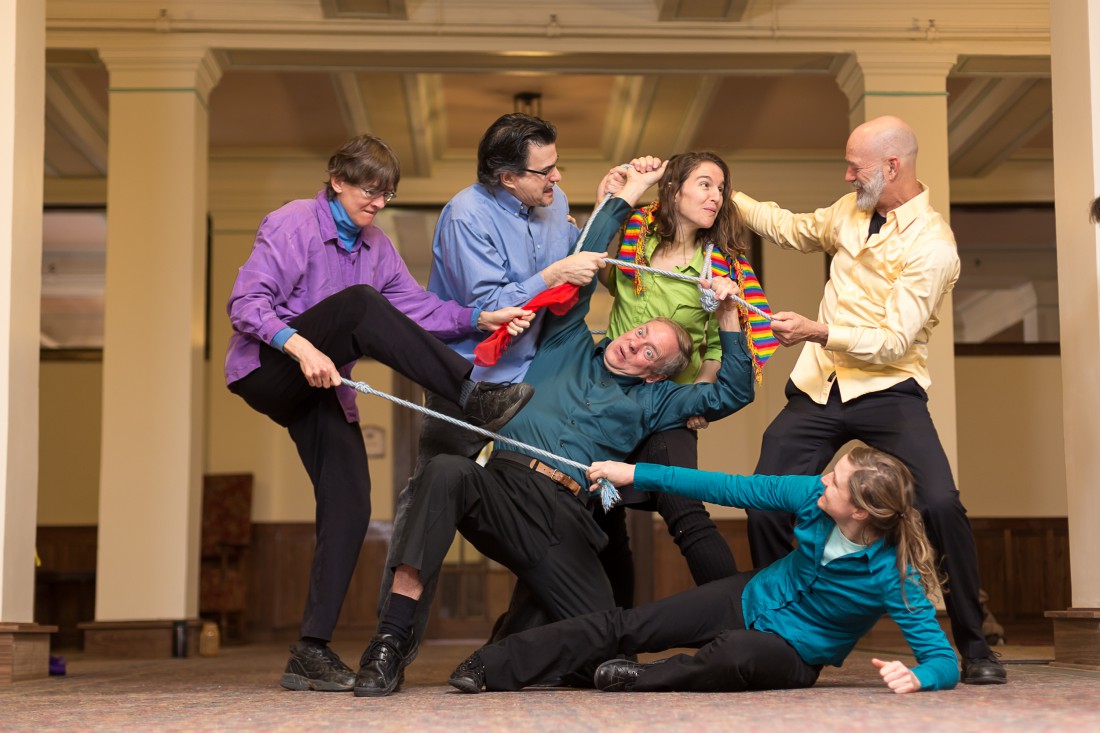“Let’s watch.” These words commence the evening’s performance at Playback Theatre. Actors come forward, improvising as they go to illustrate a story. Audience members will likely resonate with the unfolding tale because it is, after all, their story. Within this theatrical environment, actors and audience participate in a night of theater and storytelling that can be validating, healing and transformative for participants.
A Playback performance typically includes five actors, a musician and a stage conductor who leads the event. In the beginning, the conductor might introduce a theme for the evening, such as “one’s unexpected turns in life.” The conductor then invites an audience member — referred to as a teller — to share a personal story from their past or present. The conductor helps draw the story forth by asking questions and clarifying the tale. The actors then turn the story into a performance.
Unlike its forerunner, psychodrama, a fairly widespread form of therapy where participants act out internal conflicts through performance, Playback is not an exclusively therapeutic process. However, it often has healing effects for participants. “In the act of selecting words and choosing how you tell the story, you’re creating it anew, discovering it as you go,” says former artistic director Deb Scott, who remains connected to the company by facilitating Playback workshops. “It brings a new perspective and understanding in the act of telling it.”
Scott says the therapeutic component goes beyond sharing stories. “The most powerful aspect is not the telling but the power of being heard, even by people whom you have never met,” she adds. “Your story has a resonance with other people.”
For the actors themselves, listening to and acting out the story is a method of getting in touch with their own emotions and playing them back in an honest, insightful way. In listening closely to the story, the actors “can intuit beyond the words, take a risk and find the story underneath the story and tap into that,” says Scott. “This can extend the healing process.”
In debating whether or not to visit her 97-year-old mother, one teller, Deidre Duffy, shared her frustration about coping with an aging parent who lives far away. Each actor embodied a different facet of her dilemma. But when one actor played “the part of me that was not ready to let my mom go, I was moved to tears,” says Duffy. “I was amazed at how that moved me so. My mom had been in and out of hospitals for years. Now she’s in hospice. I thought I was completely ready to let her go, but from my reaction to that simple scene, I realized I was not. It wasn’t long after that that I booked a flight to Cleveland to visit her.”
Another Playback participant, Maria Thomas says, “When I tell my story it’s like a mirror, but it’s more than just a mirror. It’s enlarging.” This process itself helps provide perspective on whatever dilemma the teller might be experiencing at the time.
“We’re just inviting stories, and one story seems to inspire another story. We’re all in this exploration,” company member Daniel Barber adds. “One person’s story answers another person’s story. … What that person needs to hear, somebody else answers. It’s a community experience.”
Along with public performances, Scott offers a free, three-hour Playback workshop every third Saturday of the month for people who would like to explore the process. Anyone curious about Playback, including newcomers with no acting experience, are encouraged to attend.
Sarah Herman attended a Playback workshop for the first time, expecting to sit back and get a sense of it. “I’m not an actress,” she says. “But it felt like a really safe and intimate space.” After jumping in and acting out a story, Herman comments, “I was surprised at how I felt such an empathic connection to a stranger’s story.”
Free Playback workshops take place every third Saturday of the month, 10 a.m.-1 p.m. at Harvest House, 205 Kenilworth Road.




Before you comment
The comments section is here to provide a platform for civil dialogue on the issues we face together as a local community. Xpress is committed to offering this platform for all voices, but when the tone of the discussion gets nasty or strays off topic, we believe many people choose not to participate. Xpress editors are determined to moderate comments to ensure a constructive interchange is maintained. All comments judged not to be in keeping with the spirit of civil discourse will be removed and repeat violators will be banned. See here for our terms of service. Thank you for being part of this effort to promote respectful discussion.